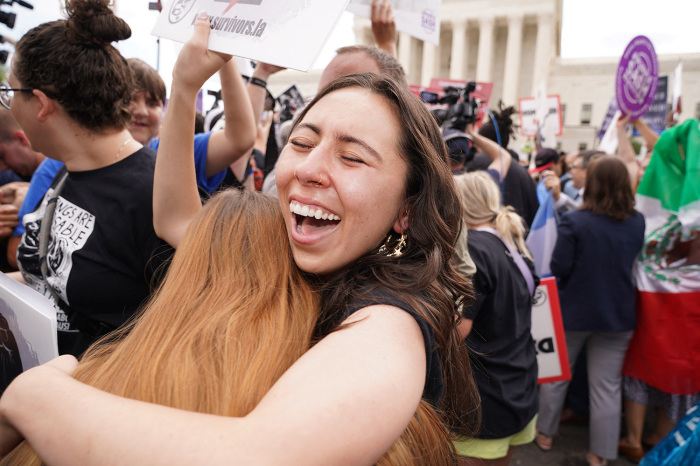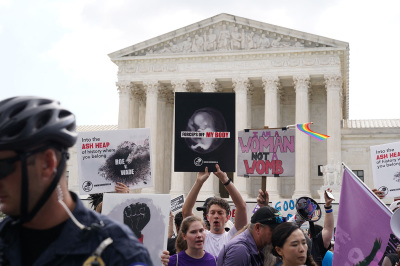Supreme Court overturns Roe v. Wade in Mississippi abortion ruling

The U.S. Supreme Court has overruled the landmark 1973 decision of Roe v. Wade, concluding that there is no constitutional right to an abortion.
In a decision released Friday in the case of Thomas Dobbs, et. al. v. Jackson Women’s Health Organization, the high court ruled 6-3 to uphold Mississippi’s Gestational Age Act, which bans most abortions after 15 weeks into a pregnancy.
"Held: The Constitution does not confer a right to abortion; Roe and Casey are overruled; and the authority to regulate abortion is returned to the people and their elected representatives," the syllabus to the majority opinion reads.
Justice Samuel Alito authored the majority opinion and was joined by Justices Clarence Thomas, Amy Coney Barrett, Brett Kavanaugh and Neil Gorsuch. Kavanaugh, Thomas and Chief Justice John Roberts all wrote concurring opinions.
"We hold that Roe and [Planned Parenthood v. Casey] must be overruled. The Constitution makes no reference to abortion, and no such right is implicitly protected by any constitutional provision," wrote Alito.
"Roe was egregiously wrong from the start. Its reasoning was exceptionally weak, and the decision has had damaging consequences. And far from bringing about a national settlement of the abortion issue, Roe and Casey have enflamed debate and deepened division."

The majority opinion stated that it is "time to heed the Constitution and return the issue of abortion to the people’s elected representatives."
While the Roe opinion made abortion a national right and limited the states' ability to enact laws restricting abortion before fetal viability, the court's 1992 ruling in Planned Parenthood v. Casy upheld the right to an abortion established by Roe.
"The critical question is whether the Constitution, properly understood, confers a right to obtain an abortion. Casey’s controlling opinion skipped over that question and reaffirmed Roe solely on the basis of stare decisis," the syllabus states.
Justices Stephen Breyer, Sonia Sotomayor and Elena Kagan filed a dissenting opinion, claiming that Roe and Casey "struck a balance" between allowing abortion and allowing laws to regulate it.
"Today, the Court discards that balance. It says that from the very moment of fertilization, a woman has no rights to speak of. A State can force her to bring a pregnancy to term, even at the steepest personal and familial costs," the dissent reads.
"The Mississippi law at issue here bars abortions after the 15th week of pregnancy. Under the majority’s ruling, though, another State’s law could do so after ten weeks, or five or three or one — or, again, from the moment of fertilization. States have already passed such laws, in anticipation of today’s ruling. More will follow."

In 2018, Mississippi Gov. Phil Bryant signed House Bill 1510, the Gestational Age Act, which banned most abortions performed 15 weeks into a pregnancy. At the time, Bryant said the bill would help make "Mississippi the safest place in America for an unborn child."
While the law provided exemptions for abortions performed due to life-threatening medical emergencies for mothers or “severe fetal abnormality,” it did not include exemptions for rape or incest.
The law was viewed as a direct challenge to the landmark Supreme Court ruling in Roe.
Jackson Women's Health, the only licensed abortion clinic in Mississippi, filed a lawsuit against the law, with a federal court granting them a restraining order.
In December 2019, a three-judge panel of the U.S. Court of Appeals for the Fifth Circuit upheld the lower court ruling, granting a permanent injunction against the legislation.
Circuit Judge Patrick Higginbotham authored the panel opinion, concluding that the law went against “a woman’s right to choose an abortion before viability.”
“States may regulate abortion procedures prior to viability so long as they do not impose an undue burden on the woman’s right, but they may not ban abortions,” he wrote.
“The law at issue is a ban. Thus, we affirm the district court’s invalidation of the law, as well as its discovery rulings and its award of permanent injunctive relief.”
The Supreme Court agreed to hear an appeal in May 2021 and heard oral arguments on the Dobbs case last December, with pro-life and pro-choice activists holding dueling rallies outside of the Supreme Court in Washington, D.C.
Marjorie Dannenfelser, president of the national grassroots pro-life activist group Susan B. Anthony Pro-Life America, called the decision a "historic human rights victory for unborn children and their mothers and a bright pro-life future for our nation.”
“Today the Supreme Court, in line with modern science and overwhelming public consensus, recognized the truth in every mother’s heart and that pro-life advocates have argued all along: unborn children are human beings, deserving of protection," Dannenfelser said in a statement. "Every legislature in the land, in every single state and Congress, is now free to allow the will of the people to make its way into the law through our elected representatives."
The Planned Parenthood Action Fund called the court's ruling "as dangerous as it is shocking" because "it opens the floodgates for states across the country to ban abortion."
"This final decision in Dobbs v. Jackson Women’s Health Organization ... could lead 26 states to quickly move to ban abortion, leaving at least 36 million women of reproductive age, and other people who can become pregnant, without abortion access," the Planned Parenthood Action Fund statement reads.
"The consequences of this devastating decision will fall largely on people who already face the greatest barriers to health care due to this country’s legacy of racism and discrimination, including Black, Latino, and Indigenous communities, people with low incomes, LGBTQ+ people, immigrants, and people living in rural areas."

With Roe overturned, 21 states will completely ban or restrict abortion more severely than they do now, while 16 states will continue to allow abortion throughout most or all of pregnancy because the right to abortion has been codified into law. Ten states will continue to enforce existing abortion laws and/or restrictions. The remaining three states could let voters weigh in on abortion policy at the ballot box in the near future.
While the country awaited a decision by the high court, Politico released a leaked draft opinion in a report published May 2, which indicated that the justices were likely to overturn Roe.
The draft opinion was written in February and authored by Alito, suggesting the court would rule 5-4 in favor of overturning Roe and allowing states to decide whether to ban abortion.
Although Politico pointed out that the draft could change considerably by the time it was released, the news nevertheless sparked several protests and incidents of vandalism and arson targeting churches and pro-life offices.
Protests were held outside the homes of the justices who had signed on to the draft opinion, prompting law enforcers to increase security for the Supreme Court members.
Earlier this month, a man was arrested near the home of Justice Brett Kavanaugh. The man intended to kill the Supreme Court justice over the likely overturning of Roe but instead turned himself over to authorities.




























